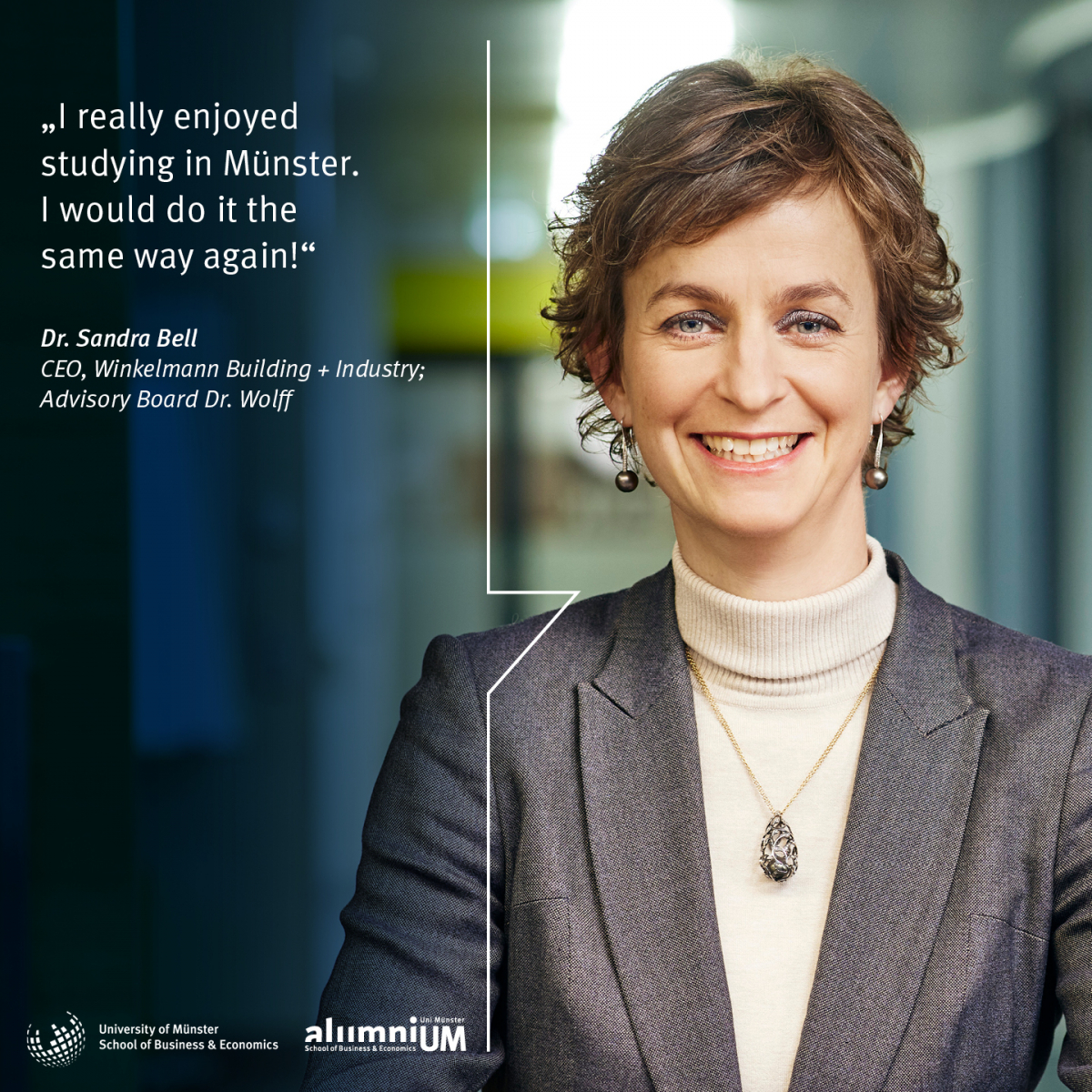Alumni Story: Dr. Sandra Bell

Many students have probably heard of advisory boards in companies. But what actually happens there, and how is it decided how an advisory board operates in detail? To get a behind-the-scenes look, we spoke with Dr. Sandra Bell. She is a member of the advisory board of the Dr. Wolff Group, studied Business Administration and Sinology at the University of Münster from 1997 to 2002, and is currently CEO of Winkelmann Building + Industry.
After completing her degree at the School of Business and Economics, Sandra Bell began her professional career at the consulting firm The Boston Consulting Group and then pursued a doctorate during a sabbatical at the University of Duisburg-Essen. Her career path led her through positions at Henkel, Hershey, and most recently as Chief Global Marketing Officer & Member of the Global Executive Board at the Viega Group. Over the years, she repeatedly spent extended periods in Shanghai. Today, she is a recognized China expert, specializing in business transformation, strategy, go-to-market, and digitalization.
In our conversation with Sandra Bell, we learn more about the work on an advisory board, life in China, and take a look back at her time at the University of Münster.
Dr. Bell, what is it like to work on an advisory board? What decisions are made there, and how can you help shape the development of a company?
There are basically two types of advisory boards. Some boards are purely advisory in nature, while others—like supervisory boards in stock corporations—monitor the operational management, i.e., the CEO and the executive team, co-define the strategy, approve annual budgets, and make key personnel decisions. At Dr. Wolff, the advisory board has a controlling function. That means we are accountable to the company’s shareholders and ensure their interests are safeguarded. In Dr. Wolff’s case, these are the interests of the founding family and their heirs. The advisory board is led and orchestrated by its chairman. It regularly meets with the executive management, is briefed on the company’s performance, and sometimes asks tough questions. At Dr. Wolff, some shareholders are also involved in day-to-day operations. This makes the environment both diverse and demanding.
You lived in Shanghai for a while. What advice would you give to people who move abroad for work?
I find other countries and cultures incredibly enriching for personal growth. When I moved to Beijing in 1999 to study the language for a year, there was no English, no digital dictionaries—you had to push through. That way, I got to know the language and myself extremely well, but also the customs and habits of the Chinese people. You have to adapt and realize that things can work differently from how you learned them in Germany. This experience made me more open to new things and even more curious to ask why something is done one way and not another. From the Chinese, I particularly took away their optimism and pragmatism. If something doesn’t work out, don’t give up—there’s always a plan B. And if you have an idea, just do it, be persistent, and believe in yourself—it will work out. I still admire what’s known as “China Speed,” their will to innovate and eagerness to learn. At the same time, I’ve learned how important it is to speak the local language to truly understand a culture. In Shanghai, I met many foreigners and expats. Unfortunately, in professional life there’s often little time to learn Chinese alongside your job. That means missing out on a lot and having limited access to people. I can only encourage young people to learn languages early in life—language is the key to dialogue and understanding others.
How did your studies at the University of Münster prepare you for your career?
I really enjoyed studying in Münster. I’d do it all the same way again! I was lucky to be able to study both at the same time: Business Administration (Diploma) and Sinology (Chinese) for a Master's. The two fields of study couldn’t have been more different. Business Administration was very professional, with 1,000 students per semester; Sinology had no more than 30 people, including professors and assistants. I had to be well-organized but was able to manage the different areas of interest independently. In hindsight—and some may groan at this—I'm glad that the School of Business and Economics placed such strong emphasis on accounting and controlling. Big thanks to Professor Baetge here. In the end, management is always about understanding and optimizing a company’s P&L and cash flow. My focus areas were marketing and international market management. To this day, these areas are invaluable when it comes to understanding customer needs and translating them into products and services. Even back then, no one was as advanced in customer journey thinking as Professor Meffert in consumer markets and Professor Backhaus on the B2B industrial side.
Many students take a long time to decide which field they want to work in. Did you know right after university which industry you wanted to pursue?
I’ve always been fascinated by companies, which is why I decided early on to study business. But during and after my studies, I had no idea which industry to go into. I did a few internships during semester breaks—at Siemens, KPMG, and L’Oréal—but ultimately decided to apply to top consulting firms. I told myself: if one of the global top three firms hires me, I’ll go into consulting—postponing the decision about a specific industry. My backup plan was an internationally oriented trainee program—Mercedes-Benz seemed exciting to me at the time. Now, more than 20 years later, I can say that I’ve always enjoyed working on the customer and strategy side—regardless of the industry. Today, decisions are more about what you want to do for the next three years. There are so many options, and you shouldn’t overthink it. Stay flexible and open—anything is possible!


